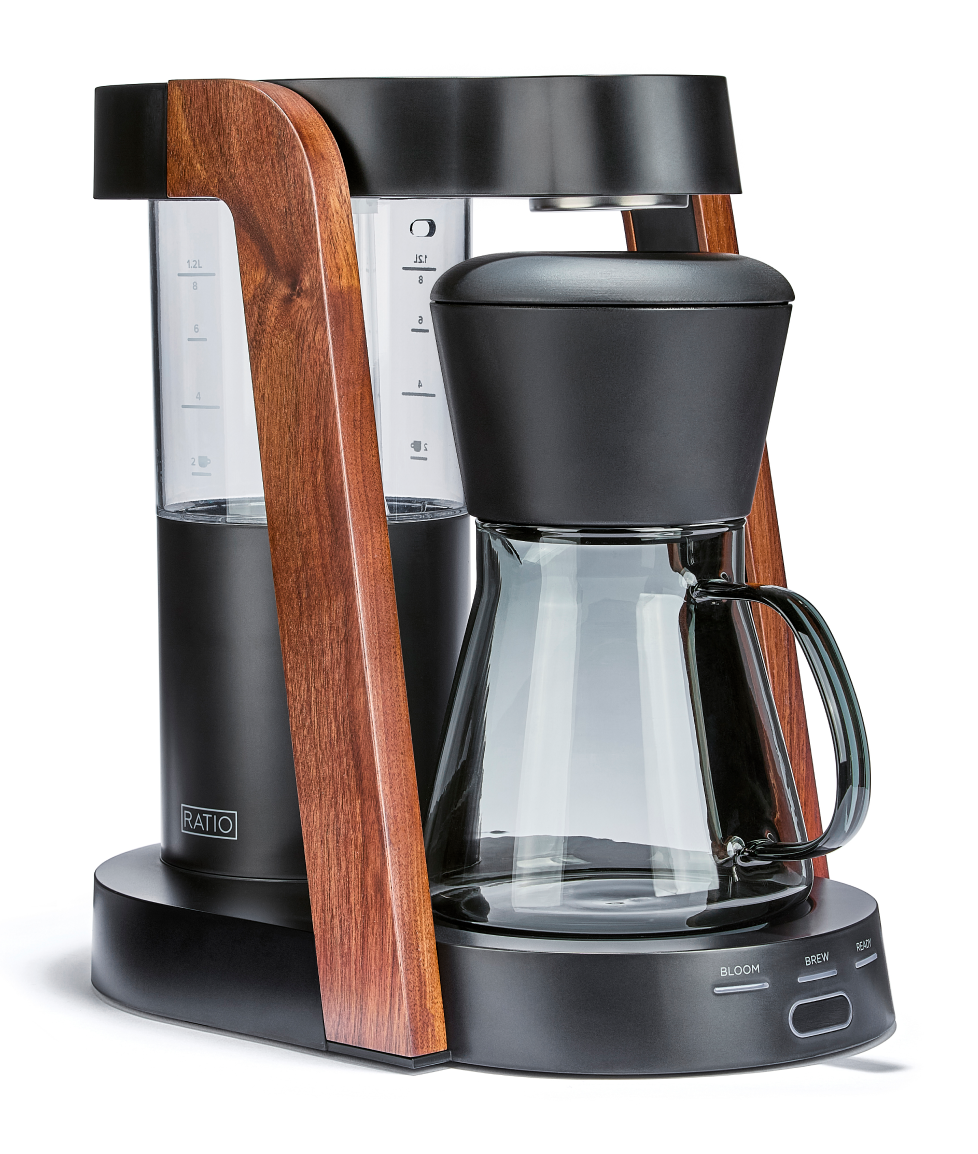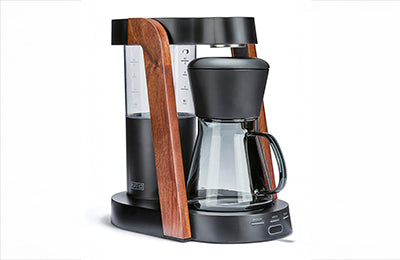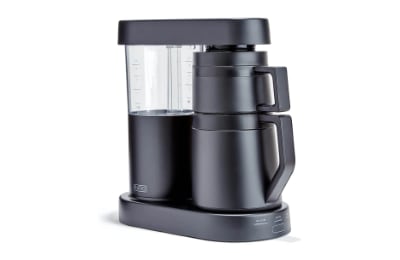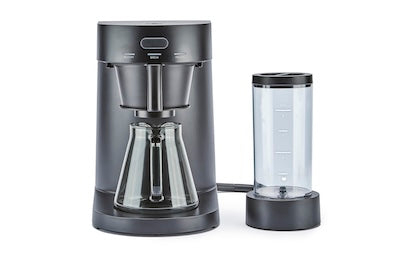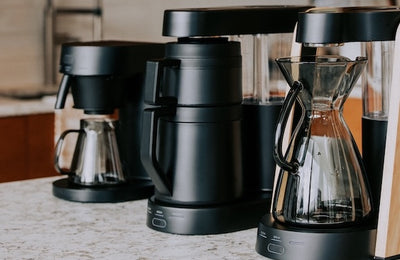Reclaiming the Black History of Coffee with Cxffeeblack
Cxffeeblack is not just a coffee company. Instead, it’s an entrepreneurial venture with a social mission to reclaim the Black history of coffee. Founders and husband/wife duo, Bartholomew Jones and Renata Henderson, do this by roasting and serving thoughtfully sourced beans from the African diaspora, hosting events, and offering apparel and coffee bags with designs inspired by streetwear culture. From there, they use funds generated by their coffee and merchandise sales to support others in their Memphis community in pursuing work in the world of coffee and beyond.
As you read this inspiring discussion with Jones and Henderson, we recommend turning on Kendrick Lamar’s third studio album, To Pimp a Butterfly, the sounds of which soundtracked much of the creation of Cxffeeblack.

So nice to meet you! Can you tell us where you’re currently located, and what your morning coffee routine looks like?
B: Right now I’m currently in Memphis, TN. My morning coffee routine looks like a V60, or the little fun-sized Chemex that went out in the Re:ico Boxes last year. I’m generally brewing up Guji Mane -- a natural Ethiopian that my wife roasts for our company Cxffeeblack.

Do you have a first memory of experiencing or tasting coffee?
B: First memory with coffee was with my church. I was a junior deacon, and I remember part of the cool thing of being a junior deacon is that we could get coffee. So you know, my church had the powdery cream and sugar, and I used to fill that up and put a couple of dashes of coffee on top and feel real grown. So that’s how I kind of got into it.

When did you decide to make coffee your career, and what were some of your first experiences working in the coffee industry?
B: I don’t think I ever really decided to make it a career -- I just started nerding out in college and sharing it with the homies over some Kendrick Lamar albums, and people just started digging it. We were brewing it for a lot of my music stuff (I’m a rapper), and kind of just treating it like any other libation that one would partake of in a hip hop setting. Then a lot of my homies, who hadn’t had a lot of experience, or been introduced to coffee started really getting into it, and I was like “we might be able to empower a lot of people with this.” Especially when I found out about coffee’s Black history. So we did coffee as a merch drop for my first album, and it sold out really fast, and after that I was kinda like “yo!” When the pandemic hit, as a teacher I lost my job, and I just prayed and God was like “go full time with this thing.” We just kind of fell into it, and we didn’t know if it would work because selling pro-Black, southern, rap coffee was like a weird proposition at the time. But God knows what’s best -- that’s the most I always know. His plan is perfect, and God just kinda dropped us in this thing.

Were there any specific events or experiences you had that led you to your mission of reclaiming the history of coffee, and starting Cxffeeblack?
B: For me, it was the story about being with the homies and listening to How to Pimp a Butterfly on vinyl, and just brewing everyone Ethiopian coffee on pourover. At the time, I think I was doing a Chemex at that point and like man that was a really transformative experience. It felt right, and I was like, “there’s something that feels historically congruent with this experience,” and I wanted to explore that more. That moment led us to be curious about coffee as a whole.

What were the beginning days of Cxffeeblack like, and how has your work grown over time?
B: I’m here with my wife -- what would you say the beginning days were like?
R: Long and we were scrambling…but fun!
B: It was definitely fun! Pay was very little, but more so like kind of working on a dream and doing events. We were both still working full time jobs so it was definitely interesting. Now my wife is our roaster so what has that process been like, babe, growing into full time coffee now yourself, not just doing graphic design and HR, but now doing all that plus the roasting?
R: Yeah it was fun! I feel like it was almost an inheritance. I inherited something special that I’ll be able to pass down to whoever. As we grow, I’ll pass it down. It feels almost like a royal knighting. I enjoy it a lot.

How do you and your partner and wife, Renata Henderson, collaborate on running Cxffeeblack? Are there specific parts of the entrepreneurial venture that you each focus on?
R: Yeah, he’s the visionary -- the color. He sees big picture down the road. He’s seeing like 10 years down the road generally -- the impact on the community. I’m more of the black and white with the details between the big picture. So like the small puzzle pieces, the HR, the hiring, the meetings. All the stuff that would get in the way of the big picture, but will help lead to the big picture.
B: We always used to say that “I am the coffee and you’re the black in Cxffeeblack.” But now you’re the roaster so it’s like she’s the roaster and I’m the barista. So I kind of do people facing stuff, and she does the systems and processes that make all this stuff possible. From graphic design to scheduling team meetings, to doing inventory, to roasting. Renata really does it all.
R: I just brewed today!
B: Yeah, she just did one of her first pourovers -- so getting her pourover game on! It was good too.
Can you tell us more about the events, programming, and initiatives Cxffeeblack creates and participates in? Are there any coming up in 2021 that you are especially looking forward to?
B: The thing we’re looking forward to the most is launching our internship program!
R: It’s called the “SIT Internship program” it means “Specialist in Training.” And then we have a “LIT Internship program” which is a “Leadership in Training.” And what we want to do is partner with other shops -- do a long term collaboration with shops around the city to send out coffee specialists in our city, people who are trying to do it professionally, and help them to thrive and flourish in the city.
B: Big facts. Big facts. That and the trip to Africa are our biggest things. Shooting a documentary, going to go study the Black history and culture around coffee, and think about what a Black future in coffee could look like through Black culture.
What are some of the key pieces of coffee history that you wish more people knew about?
B: I feel like we’ve been really talking about the same piece in there, and everyday there is something that someone is like “I didn’t know about that.” That coffee has a Black origin, and that it has a piece in the Black future as well is really the thing that we’re most excited to think about and dream about. And I wish more people knew about that, and knew that coffee is inherently Black in its origin, and therefore can become Black again in its present. It’s been Black in its history, and we pray that it continues to become part of the Black community even more so in the future. And I think also right now there’s a lot going on with a bunch of communities that are Black in the diaspora -- The Caribbean, Central America, South America, or on the African continent that are seeing coffee be something that either has been used to harm them in the past or is in danger of being harmful in the future. We’re excited to see more opportunities for Black empowerment through coffee across the diaspora.

We’d love to learn more about your current line-up of bean offerings! It’s clear to see that they go beyond just satisfying the taste cravings of those looking for a great cup of coffee, and instead also serve as an educational jumping off point that delves into the connection between coffee, colonialism, and slavery.
B: Right now we have our OG Guji Mane which is natural processed coffee from the Hambella washing station in Guji zone in Oromia, which is in the southern part of Ethiopia. Then we have an Ethiopian coffee from Cauca, produced by a brother named Yailton, who’s an Afro-Colombian farmer, descendant of the slave trade in Colombia. Also the washed Colombian, which we were just talking about -- it’s a beautiful bean, it’s one of my favorites. Then we also have a Baptiste Haitian coffee brought to us by Javae Coffee, which is owned by a Haitian brother who owns a coffee company in Nashville. His family owns 70 acres of coffee land in Haiti so this coffee is produced by them. It’s a washed coffee, and Haitian coffee is really unique as well. We’re trying to represent the diaspora through our coffee offerings, and I’m pretty excited about that.

The vibrant merch you create is also a huge part of Cxffeeblack! How do you come up with your designs, and what is your process behind creating pieces that are stylish and wearable, and also spread important messages?
R: Inspiration -- I think we draw inspiration from pop culture, from Black culture, from random inspiration in nature. It comes from different places. Sometimes we have a specific look that we want as an end goal and we kind of work backwards.
B: Yeah, we kind of start with Black culture, like “what are the things that we see in our culture and our community, and the hip hop community” and then we kind of work backwards to see what would possibly make sense there. A lot of the design has been coming from Off-White, and some of their design aesthetics, and flips on looks that you might see in the street wear culture. But still trying to keep things minimalistic as well. Then my wife sometimes will just send us fire designs. The “No Place like home Design” that joint was gas. You just sent that joint along one day and I was like “yeah, yeah this!”
You have a big trip to Africa planned for this year! Can you tell us more about where you’re going and your plans when you arrive at your destinations?
B: We’re going to Ethiopia! We had planned to go to three countries, but because of the delays, we’re focusing on Ethiopia. We’re gonna get the chance to go to Guji where the coffee is from, meet new producers, hopefully build relationships that can lead us to creating an all black supply chain for Guji Mane next year. We also hope to be able to interview different people about the connections between coffee and culture in Ethiopia as a model for how other Black communities can interact with coffee. We want to interview coffee importers/exporters, baristas, coffee professionals in America, black coffee professionals to be specific, and then also hopefully even rappers and people in the music scene out there about the connection between coffee and black culture.

What’s your favorite coffee brew method, and what coffee are you currently loving?
B: It’s that Guji Mane! Recently I’ve been brewing it on this small, kinto brewer, but I’ve been using a Kalita Wave filter on it and it’s been kinda gas (gas means it was fire, which means it was good lol). So like 196 degrees, doing the Hoffman method, but like doing agitation with a spoon on the bloom and the first pour, I guess technically the second pour. So yeah, that’s what we’ve been doing! We also had a crazy batch brew of it last week, when one of our Barista homies from the neighborhood, Monte (shout to our Baristas Monte and KD btw) dialed it in for the cypher on Friday. There was crazy watermelon jolly rancher note. Not sure exactly what he did, so we’ve been chasing that all weekend.
Website: cxffeeblack.com
Instagram: @cxffeeblack
Podcast: The Cxffeeblack Podcast
GoFundMe to Help Cxffeeblack get to Africa: Support here
 Ratio Eight S2
Ratio Eight S2
 Ratio Eight Original
Ratio Eight Original
 Ratio Six
Ratio Six
 Ratio Four
Ratio Four
 Compare Machines
Compare Machines
